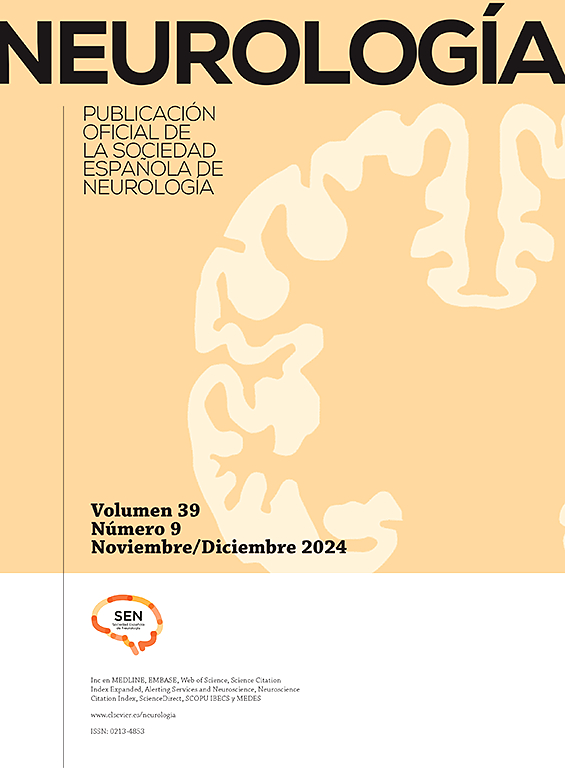SEGUICTUS研究:西班牙中风患者的管理和随访
IF 2.9
4区 医学
Q2 CLINICAL NEUROLOGY
引用次数: 0
摘要
中风是成人获得性残疾的主要原因,也是导致死亡的第二大原因。开展SEGUICTUS项目的目的是了解西班牙不同医院的临床管理情况,以促进采取纠正措施,减少其发病率和由此产生的后果。方法采用横断面多中心调查方法,对40个问题进行意见、态度和行为调查。来自西班牙不同地区的205名神经病学专家参与了这项调查。结果三级医院和地方医院卒中管理资源利用率较低。36.6%的参与者评估了超过一半的患者是否存在认知障碍,37.6%的参与者使用特定的问卷来评估不到10%的患者是否存在认知障碍。最好的治疗方案是乙酰胆碱酯酶抑制剂和胆碱。在入院期间开始康复治疗的参与者百分比中观察到统计学上显著差异,在三级医院中较低。结论脑卒中患者护理单位、方案和专科会诊的缺乏可能影响脑卒中潜在后遗症(如认知功能障碍和运动后遗症)的治疗。对脑卒中管理中的缺陷点进行评估并采取相应的纠正措施是必要的。本文章由计算机程序翻译,如有差异,请以英文原文为准。
Estudio SEGUICTUS: manejo y seguimiento del paciente con ictus en España
Introduction
Stroke is the leading cause of acquired disability in adults and the second leading cause of death. The SEGUICTUS project was carried out with the aim of knowing its clinical management in different hospitals in Spain, in order to promote corrective measures to reduce its incidence and derived consequences.
Methods
This cross-sectional multicenter research was carried out through a survey of 40 questions on opinion, attitude and behavior. The survey was answered by 205 neurology specialists from different regions of Spain.
Results
The availability of resources for stroke management was statistically lower in tertiary and regional hospitals. 36.6% of the participants assessed the presence of cognitive impairment in more than half of the patients, and 37.6% used specific questionnaires to assess cognitive impairment in less than 10% of the patients. The best considered therapeutic options for its treatment were acetylcholinesterase inhibitors and citylcholine. Statistically significant differences were observed in the percentage of participants who began rehabilitation treatment during admission, being lower in tertiary hospitals.
Conclusions
The shortage of stroke units, protocols and specialized consultations for the care of stroke patients may have an impact on the treatment of potential sequelae of stroke, such as cognitive impairment and motor sequelae. It is necessary to evaluate the deficit points in stroke management and implement the appropriate corrective measures.
求助全文
通过发布文献求助,成功后即可免费获取论文全文。
去求助
来源期刊

Neurologia
医学-临床神经学
CiteScore
5.90
自引率
2.60%
发文量
135
审稿时长
48 days
期刊介绍:
Neurología es la revista oficial de la Sociedad Española de Neurología y publica, desde 1986 contribuciones científicas en el campo de la neurología clínica y experimental. Los contenidos de Neurología abarcan desde la neuroepidemiología, la clínica neurológica, la gestión y asistencia neurológica y la terapéutica, a la investigación básica en neurociencias aplicada a la neurología. Las áreas temáticas de la revistas incluyen la neurologia infantil, la neuropsicología, la neurorehabilitación y la neurogeriatría. Los artículos publicados en Neurología siguen un proceso de revisión por doble ciego a fin de que los trabajos sean seleccionados atendiendo a su calidad, originalidad e interés y así estén sometidos a un proceso de mejora. El formato de artículos incluye Editoriales, Originales, Revisiones y Cartas al Editor, Neurología es el vehículo de información científica de reconocida calidad en profesionales interesados en la neurología que utilizan el español, como demuestra su inclusión en los más prestigiosos y selectivos índices bibliográficos del mundo.
 求助内容:
求助内容: 应助结果提醒方式:
应助结果提醒方式:


